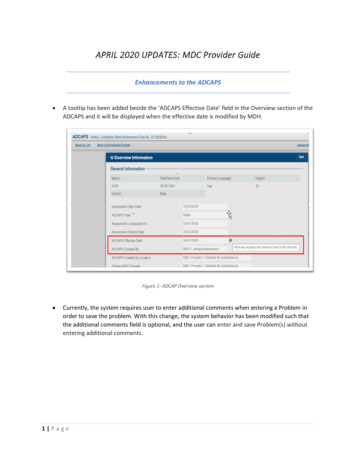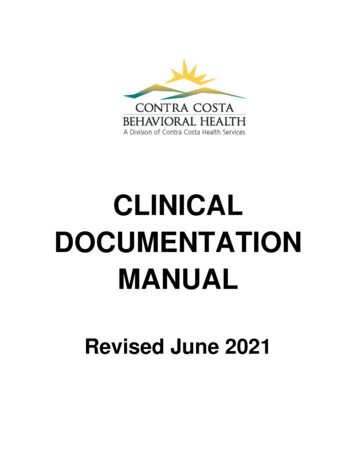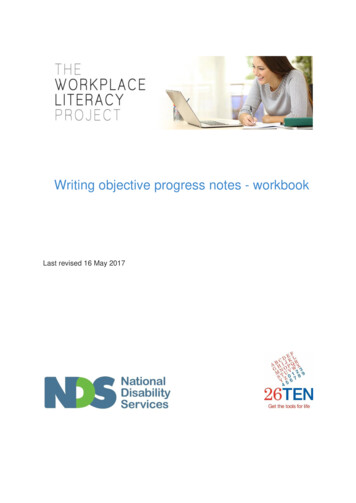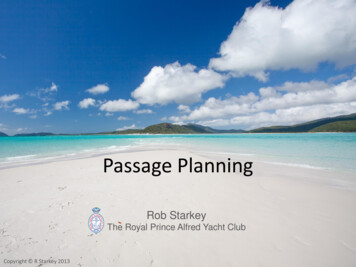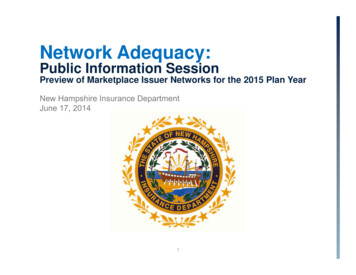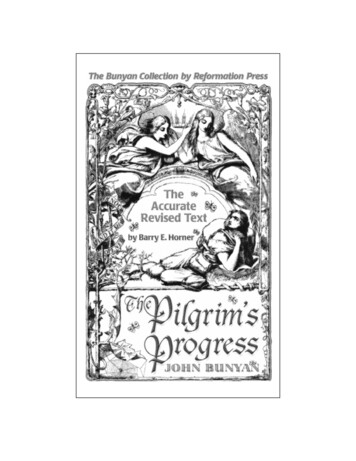
Transcription
THE PILGRIM’S PROGRESSi
iiJOHN BUNYANReformation Press160 37th StreetLindenhurst, NY ormationpress.comISBN 0-9670840-2-4 1999 Barry E. HornerAll rights reserved under International and Pan-American CopyrightConventions. No part of this book may be reproduced in any formor by any electronic or mechanical means including informationstorage and retrieval systems without the expressed permission fromthe publisher in writing, except in the case of brief quotationsembodied in critical articles or critical reviews.For information address the publishers:Reformation Press 160 37th Street, Lindenhurst, NY 11757Book Cover Design by Michael RotoloManufactured in the United States of America1 2 3 4 5 6 7 8 9 1099 00 01 02 03
THE PILGRIM’S PROGRESSTHEPilgrim’s ProgrefsFROMT H I S W O R L D,TOThat which is to come:Delivered under the Similitude of aDREAMWherein is Difcovered,The manner of his fetting out,His Dangerous Journey, And fafeArrival at the Defired Countrey.I have ufed Similitudes, Hof. 12:10.By John Bunyan.Licenfed and Entred according to Order.L O N D O N,Printed for Nath. Ponder at the Peacockin the Poultrey near Cornhil , 1678.Original Title Page, First Editioniii
ivJOHN BUNYANThe Sleeping PortraitEngraved by Robert White, it was most likelyintended for the first edition of 1678, thoughwithdrawn due to the name ‘Destruction’ beingincorrectly titled ‘Vanity’. The above correctedpicture was included in the third edition of 1679.
THE PILGRIM’S PROGRESSPrinciples of theACCURATE REVISED TEXT1.2.3.4.5.The basis of this revision is the definitive text ofThe Pilgrim’s Progress edited by J. B. Wharey andRoger Sharrock, and published by Oxford Press(Clarendon) in 1960.Of foremost consideration has been a style of simpleconversational English that, while not being racy, yetmaintains faithfulness to the style, meaning, doctrine,and purposes of John Bunyan. This editor welcomessuggestions and constructive criticism in this regard.A select variety of archaisms has been retained, withmodern equivalent terms in brackets, since theseexpressions have gained a particular timeless qualityand quaintness about them that are intrinsic to ThePilgrim’s Progress. Certain other antiquated modes ofsentence construction have been modified to produce amore contemporary style of expression.Chapter headings, as well as occasional subdivisions,have been added to assist in the understanding of ThePilgrim’s Progress.The marginal Scripture references and most notationsincluded by John Bunyan have been retained asfootnotes and also revised. In certain instances, wherean item appears to be redundant, the notation has beenexcluded. Of course the text includes countless otherallusions to Bible passages, and a number of these arereferenced in italics as footnotes. Some additionalclarifying comments on the text have been added aswell.Barry E. Hornerv
viJOHN BUNYAN
THE PILGRIM’S PROGRESSviiTABLE OF CONTENTSIntroductionixThe Author’s Apology for His Book1The Pilgrim’s Progress in the Similitude of a Dream91.Christian flees from the City of Destruction92.Christian is pursued by Obstinate and Pliable133.Christian and Pliable converse along the way164.Christian and Pliable confront the Slough of Despond195.Christian encounters Mr. Worldly-Wiseman226.Christian seeks after the Town of Morality267.Christian arrives at the Wicket-gate328.Christian is instructed at the house of the Interpreter36A.The portrait of the godly pastor36B.The distinction between the law and the gospel37C.The virtue of patience contrasted with passion38D. The grace of Christ conquers the assailed heart40E.The persevering valiant pilgrim41F.The despairing reprobate in the iron cage42G. The warning of the final day of judgment44Christian arrives at the Place of Deliverance479.10. Christian overtakes Simple, Sloth, and Presumption4911. Christian converses with Formalist and Hypocrisy5012. Christian ascends the Hill Difficulty5313. Christian is approached by Timorous and Mistrust5514. Christian meets lion-sized opposition5815. Christian resides at the Palace Beautiful59
JOHN BUNYANviii16. Christian enters into battle with Apollyon7117. Christian confronts the Valley of the Shadow of Death7718. Christian overtakes and converses with Faithful8419. Christian and Faithful converse with Talkative9420. Evangelist reappears to give timely warning10721. Christian and Faithful on trial at Vanity Fair11022. Christian and Hopeful converse with Byends12123. The silver mine at the hill Lucre13024. The monument to Lot’s wife13325. Christian and Hopeful are captured by Giant Despair13626. Christian and Hopeful at the Delectable Mountains14627. Christian and Hopeful first encounter Ignorance15128. The terrifying end of Turn-away15329. The colorless testimony of Little-faith15430. Christian and Hopeful snared by the Flatterer16331. Christian and Hopeful meet returning Atheist16632. Christian and Hopeful cross the Enchanted Ground169A.Hopeful testifies to his conversion at Vanity Fair170B.Closer reacquaintance is made with Ignorance177C.Christian recalls his acquaintance with Temporary 18633. The comforting delights of Beulah Land19034. Christian and Hopeful encounter the River of Death19335. Christian and Hopeful are welcomed into heaven19636. The fearful end of Ignorance201The Conclusion203A Further Defense204
THE PILGRIM’S PROGRESSINTRODUCTIONthe latter half of this twentieth century,numerous revisions of The Pilgrim’s Progresshave been published. However, while severalof these publications have proved to be accurate anduseful, many have been lacking in precision, not only inlinguistic style, but also with regard to the author’sdoctrinal intentions.Doubtless John Bunyan would have heartily agreedthat his allegory should be made as clear as is possibleto this modern generation, though without sacrificingtruth and his attractive plainness of writing.With this in mind, yet another contemporaryrendering is offered with the earnest desire that it willprove faithful to the Bedford tinker’s expressedpurpose, namely that the reader perceive the substanceof Bible and gospel truth that lies beyond the veil ofallegorical style.URINGBarry E. Hornerix
xJOHN BUNYAN
THE PILGRIM’S PROGRESS1THE AUTHOR’S APOLOGYFOR HIS BOOKWHEN at first I took my pen in hand,To write this way, I did not understandThat I at all should make a little bookIn such a style; no, I had undertookTo make another, which when almost done,1Before I was aware, I this begun.And so it was: I writing of the wayAnd race of saints in this our gospel day,Fell suddenly into an allegory2About their journey, and the way to glory,In more than twenty things, which I set down;This done, I twenty more had in my crown,And they again began to multiply,Like sparks that from the coals of fire do fly.Then no, I thought since if you breed so fast,I’ll put you by yourself, lest you at lastShould prove ad infinitum, and eat outThe book that I already am about.Well, so I did; but yet I did not thinkTo show to all the world my pen and inkIn such a style; I only thought to makeI knew not what, nor did I undertakeThereby to please my neighbor; no, not I,I did it my own self to gratify.1Probably The Heavenly Footman based on I Corinthians 9:24.2Bunyan also refers to his allegorical style, in this and his concludingpoem, as similitude, metaphor, parable, figure, type, fable, andshadow.
JOHN BUNYAN2Neither did I but vacant seasons spendIn this my scribble; nor did I intendBut to divert myself in doing this,From worser thoughts which make me do amiss.Thus I set pen to paper with delight,And quickly had my thoughts in black and white.For having now my method by the end [tail],Still as I pulled it came,3 and so I pennedIt down, until it came at last to beFor length and breadth the bigness that you see.Well, when I had thus put my ends together,I showed them others, that I might see whetherThey would condemn them, or them justify:And some said, “Let them live”; some, “Let themdie”;Some said, “John, print it”; others said, “Not so”;Some said, “It might do good”; others said, “No”.Now was I in a straight [plight], and did not seeWhich was the best thing to be done by me;At last I thought, since you are thus divided,I will print it, and so the case decided.For, thought I, some I see would have it done,Though others in that channel do not run.To prove then who advised for the best,Thus I thought fit to put it to the test.I further thought, if now I did denyThose that would have it thus, to gratify,I did not know, but hinder them I might,Of that which would to them be great delight.For those that were not for its coming forth,I said to them, “Offend you I am loath;Yet since your brethren pleased with it be.Forbear to judge till you do further see.”3Bunyan is probably alluding to a woman pulling thread from aspinning-wheel.
THE PILGRIM’S PROGRESS3If that you will not read, let it alone;Some love the meat, some love to pick the bone:Yes, that I might them better palliate,I did too with them thus expostulate.May I not write in such a style as this?In such a method too, and yet not missMine end, your good? Why may it not be done?Dark clouds bring waters, when the bright bring none;Yes, dark or bright, if they their silver dropsCause by descent, the earth to yielding crops,Give praise to both, and carpeth [censure] not ateither,But treasure up the fruit they yield together;Yes, so combine them both, that in her fruitNone can distinguish this from that, they suitHer well when hungry; but if she be fullShe spews out both, and makes their blessings null.You see the ways the fisherman does takeTo catch the fish, what engines he does make?Behold! how he engages all his wits,Also his snares, lines, angles, hooks and nets.Yet fish there be, that neither hook nor line,Nor snare, nor net, nor engine can make thine;They must be groped for, and be tickled too,Or they will not be caught, whate’er you do.4How does the fowler seek to catch his game?By varied means, all which one cannot name.His gun, his nets, his lime-twigs,5 light and bell;He creeps, he goes, he stands; yes, who can tellOf all his postures? Yet there’s none of theseWill make him master of what fowls he please.Yes, he must pipe, and whistle to catch this;Yet if he does so, that bird he will miss.4Matt. 4:19.5Twigs smeared with sticky birdlime used to snare small birds.
JOHN BUNYAN4If that a pearl may in a toad’s head dwell,6And may be found too, in an oyster-shell;If things that promise nothing, do containWhat better is than gold; who will disdain(That have an inkling of it) there to look,That they may find it? Now my little book,(Though void of all those paintings that may makeIt with this or the other man to take,)Is not without those things that do excel,What do in brave but empty notions dwell.“Well, yet I am not fully satisfied, thatThis your book will stand when soundly tried.”Why, what’s the matter? “It is dark [obscure]”,7 Whatthough?“But it is feigned [fiction].” What if that is so?Some men by words of fiction, dark as mine,Make truth to spangle, and its rays to shine.“But they lack solidness.” Speak man your mind;“They drowned the weak; metaphors make us blind.”Solidity, indeed becomes the penOf him that writes things divine to men;But must I needs lack solidness, becauseBy metaphors I speak; were not God’s laws,His gospel laws in olden time held forthBy types, shadows and metaphors? Yet loathWill any sober man be to find faultWith them, lest he be found for to assaultThe highest wisdom. No, he rather stoops,And seeks to find out what by pins and loops,By calves and sheep, by heifers and by rams,By birds and herbs, and by the blood of lambs;God speaks to him, and happy is heThat finds the light and grace that in them be.6An allusion to the mythical belief that certain precious gems wereformed in the head of a toad.7Ps. 78:2.
THE PILGRIM’S PROGRESSBe not too forward therefore to concludeThat I lack solidness, that I am rude [superficial];All things solid in show not solid be;All things in parables despise not we,Lest things more hurtful lightly we receive,And things that good are, of our souls bereave.My dark and cloudy words they do but holdThe truth, as cabinets enclose the gold.The prophets used much by metaphorsTo set forth truth; yes, who so considersChrist, his Apostles too, shall plainly see,That truths to this day in such garments be.Am I afraid to say that holy writ,Which for its style and phrase puts down [quells]all wit,Is everywhere so full of all these things,Dark figures, allegories? Yet there springsFrom that same book that luster, and those raysOf light that turns our darkest nights to days.Come, let my carper [critic] to his life now look,And find there darker lines than in my bookHe finds any. Yes, and let him knowThat in his best things there are worse lines too.May we but stand before impartial men,To his poor one, I dare adventure ten,That they will take my meaning in these linesFar better than his lies in silver shrines.8Come, truth, although in swaddling-clothes,9 I findInforms the judgment, rectifies the mind,Pleases the understanding, makes the willSubmit; the memory too it does fillWith what our imagination does please;Likewise, it tends our troubles to appease.8Acts 19:24.9Infant or allegorical dress.5
JOHN BUNYAN6Sound words I know Timothy is to use,10And old wives’ fables he is to refuse;11But yet grave Paul him nowhere does forbidThe use of parables; in which lay hidThat gold, those pearls, and precious stones that wereWorth digging for, and that with greatest care.Let me add one more word, O man of God!12Are you offended? Do you wish I hadPut forth my matter in another dress,Or that I had in things been more express?Three things let me propound, then I submitTo those that are my betters, as is fit.1. I find not that I am denied the useOf this my method, so I no abusePut on the words, things, readers, or be rudeIn handling figure, or similitude,In application; but, all that I may,Seek the advance of truth this or that way.Denied did I say? No, I have leave,(Example too, and that from them that haveGod better pleased by their words or ways,Than any man that breathes nowadays),Thus to express my mind, thus to declareThings unto you that more excellent are.2. I find that men, as high as trees, will writeDialogue-wise; yet no man does them slightFor writing so; indeed if they abuseTruth, cursed be they, and the craft they useTo that intent; but yet let truth be freeTo make her sallies [charges] upon you and me,Which way it pleases God. For who knows how,Better than he that taught us first to plough,10II Tim. 1:13.11I Tim. 4:7.12I Tim. 6:11. Bunyan’s objectors were most likely pastors.
THE PILGRIM’S PROGRESSTo guide our mind and pens for his design?And he makes base things usher in divine.3. I find that holy writ in many placesHas likeness with this method, where the casesDo call for one thing to set forth another;Use it I may then, and yet nothing smotherTruth’s golden beams; no, by this method mayMake it cast forth its rays as light as day.And now before I do put up my pen,I’ll show the profit of my book, and thenCommit both you and it unto that handThat pulls the strong down, and makes weak onesstand.This book it chalks [marks] out before your eyes,The man that seeks the everlasting prize;13It shows you whence he comes, where he goes,What he leaves undone, also what he does;It also shows you how he runs and runs,Till he unto the gate of glory comes.It shows too, who sets out for life amain[vigorously],As if the lasting crown they would attain;Here also you may see the reason whyThey lose their labor, and like fools do die.This book will make a traveler of you,If by its counsel you its rules will do;It will direct you to the Holy Land,If you will its directions understand;Yes, it will make the slothful active be,The blind also delightful things to see.Are you for something rare, and profitable?Would you see a truth within a fable?Are you forgetful? Would you rememberFrom New Year’s day to the last of December?13I Cor. 9:24; Phil. 3:14.7
JOHN BUNYAN8Then read my fancies, they will stick like burs,And may be to the helpless, comforters.This book is writ in such a dialectAs may the minds of listless men affect:It seems a novelty, and yet containsNothing but sound and honest gospel strains.Would you divert yourself from melancholy?Would you be pleasant, yet be far from folly?Would you read riddles and their explanation?Or else be drowned in your contemplation?Do you love picking meat? Or would you viewA man in the clouds, and hear him speak to you?Would you be in a dream, and yet not sleep?14Or would you in a moment laugh and weep?Would you lose yourself, and catch no harm?And find yourself again without a charm?Would read yourself, and read you know not whatAnd yet know whether you are blest or not,By reading the same lines? Oh then come hither,And lay my book, your head and heart together.JOHN BUNYANChristian14Search for the paradox of reality in an allegory.
THE PILGRIM’S PROGRESS9THE PILGRIM’S PROGRESSin the similitude of aDREAM1CHRISTIAN FLEES FROM THE CITY OFDESTRUCTIONAS I walked through the wilderness of this world, I cameupon a certain place where there was a den;1 and I lay down inthat place to sleep; and as I slept I dreamed a dream.I dreamed, and behold I saw a man clothed in rags2 standingin a certain place, with his face [turned away] from his ownhouse, a book in his hand, and a great burden on his back. Ilooked and saw him open the book, and read therein; and as heread, he wept and trembled: and not being able to containhimself any longer, he broke out with a lamentable cry,saying,“What shall I do?”3Therefore in this plight he went home, and restrained himselfas long as he could, so that his wife and children would notnotice his distress. But he could not be silent long for the reasonthat his trouble increased. Therefore at length he broke his mindto his wife and children; and thus he began to talk to them. “Ohmy dear wife,” he said, “and you the children of my bowels[deepest affections], I your dear friend am myself undone[crushed], by reason of a burden that weighs heavily upon me:moreover, I am certainly informed that this our city will beburned with fire from Heaven, in which fearful overthrow, both1Bedford jail.2Isa. 64:6; Ps. 38:4; Hab. 2:2; Luke 14:33.3Acts 16:30-31.
JOHN BUNYAN10myself, with you my wife and sweet babes, shall come to amiserable ruin, except (which alternative is not apparent) someway of escape can be found, whereby we may be delivered.”At this these close relatives of his were greatly amazed. It wasnot that they believed to be true what he said to them, butrather because they thought that some frenzy distemper[disorientating disease] had got into his head. Consequently,with the night approaching, and with the hope that sleep mightsettle his brains, they got him to bed with all haste. Howeverinstead of sleeping, he spent that evening in sighs and tears.So when the morning was come, they enquired as to how hewas feeling, and he told them, “Worse and worse.” He alsointended to talk to them again, but they began to firmly resisthim. They also contrived to drive away his demented frame ofmind by means of surly carriages toward him [responding withcontemptuous and irritating behavior]. Sometimes they wouldderide, sometimes they would chide, and at other times theywould quite neglect him.4 Therefore he began to retire to hisbedroom to pray for and pity them, and also condole [lament]over his misery. He would also walk alone in the nearby fields,sometimes reading and sometimes praying; and so for some dayshe spent his time in this manner.Now I noticed on a particular occasion, when he was walkingin the fields, that he was (according to his habit) reading in hisbook, and greatly distressed in his mind; and as he read, heburst out, as he had done before, crying, “What shall I do to besaved?”5I also saw that he looked this way and that way, as if hewould run; yet he stood still because, as I perceived, he couldnot tell which way to go. I then looked and saw a man namedEvangelist6 coming to him who asked, “For what reason are youcrying?” He answered, “Sir, I understand by the book in myhand that I am condemned to die, and after that to come to4Carnal medication for a sick soul.5Acts 2:37; 16:30.6Representing Pastor John Gifford, who greatly helped Bunyan at histime of conversion.
THE PILGRIM’S PROGRESS11judgment;7 and I find that I am not willing to do the first,8 norable to do the second.”9Then said Evangelist, “Why are you not willing to die sincethis life is accompanied with so many evils?” The man answered,“Because I fear that this burden that is upon my back will sinkme lower than the grave; and I shall fall into Tophet [a place ofburning].10 And sir, if I am not fit to go to prison, I am quitesure I am not fit to go to judgment, and as a consequence toexecution; and the thoughts of these things make me cry.”Then said Evangelist, “If this is your condition, then why areyou standing still?” He answered, “Because I do not knowwhich way to go.” Then Evangelist gave him a parchmentscroll11 on which was written within, “Fly from the wrath tocome.”12Therefore the man read the scroll, and looking uponEvangelist very carefully, said, “Which way must I go toescape?” Then said Evangelist, pointing with his finger beyond avery large field, “Do you see a Wicket-gate [small gate]13 overthere?” The man replied, “No.” Then he was asked, “Do yousee a shining light14 not quite so far away?” He said, “I think Ido.” Then said Evangelist, “Keep that light before your eye, andgo directly toward it, and then you shall see the gate,15 at which,when you knock, you will be told what you are to do.”So I saw in my dream that the man began to run. Now hehad not run far from his own door when his wife and children,perceiving his departure, began to cry out to him so that he7Heb. 9:27.8Job 16:21-22.9Ezek. 22:14.10Isa. 30:33.11Conviction of the necessity of flying.12Matt. 3:7.13Matt. 7:13-14. It was usually beside or in a larger gate.14Ps. 119:105; II Pet. 1:19.15Christ and the way to him cannot be found without the Word.
JOHN BUNYAN12might return. But the man put his fingers in his ears16 and ran oncrying, “Life, life, eternal life.”17 So he did not look behindhim,18 but rather fled toward the middle of the plain.Evangelist16Luke 14:26.17John 3:16, 36.18Gen. 19:17, cf. v. 26.
THE PILGRIM’S PROGRESS132CHRISTIAN IS PURSUED BYOBSTINATE AND PLIABLETHE neighbors also came out to see him run;15 and as he ran,some mocked, others threatened; and some cried for him toreturn. Now among those that did so, there were two that weredetermined to fetch him back by force. The name of one wasObstinate, and the name of the other was Pliable. Now by thistime the man was a good distance ahead of them; however theywere resolved to pursue him, and this they did and in a littlewhile overtook him.Then said the man [Christian], “Neighbors, why have youcome after me?” They said, “To persuade you to go back withus.” But he said, “That can by no means be. You dwell in theCity of Destruction, (the place where I also was born) as itappears, and dying there sooner or later, you will sink lowerthan the grave, into a place that burns with fire and brimstone.16Be more content good neighbors, and go along with me.”OBSTINATE: What! And leave our friends and our comfortsbehind us!CHRISTIAN: Yes (now claiming the pilgrim name ofChristian),17 because all of that which you cling to, and shouldforsake, is not worthy to be compared with a little of that whichI am seeking to enjoy;18 and if you will go along with me andpersevere, you shall obtain even as I myself; for where I go thereis more than enough to spare.19 So come away with me andprove my words.OBSTINATE: What are the things that you seek, since youleave all of the world to find them?15They that fly from the wrath to come are a gazing-stock[entertaining spectacle] to the world. Jer. 20:10.16Gen. 19:24; Rev. 20:15; 21:8.17The pilgrim claims to be a Christian before entering the Wicket-gate.18Rom. 8:18; II Cor. 4:18.19Luke 15:17, that is enough grace and mercy.
JOHN BUNYAN14CHRISTIAN: I seek an inheritance that is incorruptible,undefiled, and does not fade away; and it is laid up in Heaven,20being secure there,21 ready to be bestowed at the appointed timeupon those that diligently seek it. Read about it, if you will, inmy book.OBSTINATE: Tush [nonsense], put away your foolish book.Tell me whether you will return with us or not.CHRISTIAN: No, not for a moment, because I have laid myhand to the plough [and will not look back].22OBSTINATE: Come then, neighbor Pliable, let us turn aboutand go home without him. He represents those crazy-headedcoxcombs [pompous and silly strutting cocks] who, when possessed by some blind passion, are wiser in their own eyes thanseven men who can offer a reason.23PLIABLE: Perhaps you are right. But don’t be so critical; ifwhat good Christian says is true, then the things that he seeksafter are better than ours; my heart is inclined to go with myneighbor.OBSTINATE: What! Are there more fools than one? Beruled by me and go back. Who knows where such a brain-sickfellow will lead you? I insist, go back, go back, and be wise.CHRISTIAN: 24Come with me neighbor Pliable. There aresuch things to be had which I spoke of, and many more gloriesbesides. If you do not believe me, then read here in my book;for assuredly the truth of what is expressed in these pages hasbeen fully confirmed by the blood of he who wrote it.25PLIABLE: Well neighbor Obstinate, I begin to come to apoint [of decision]. I intend to go along with this good man, andthrow in my lot with him. But, my good companion, do youknow the way to this desirable place?20I Pet. 1:4.21Heb. 11:16.22Luke 9:62.23Prov. 26:16.24Christian and Obstinate in conflict over Pliable’s soul.25Luke 22:20; Heb. 9:17-28; 13:20-21.
THE PILGRIM’S PROGRESS15CHRISTIAN: I have been directed by a man whose name isEvangelist, to hasten toward a little gate that is before us, wherewe will receive further instruction about the way ahead.PLIABLE: Come then, my good neighbor, let us be on ourway. So both of them went on together.OBSTINATE: And I will go back to my own place. I will beno companion of such misled, fantastical [eccentric] fellows.Obstinate
JOHN BUNYAN163CHRISTIAN AND PLIABLE CONVERSEALONG THE WAYNOW I saw in my dream that when Obstinate had turnedback, Christian and Pliable talked as they went ahead over theplain; and thus they entered into earnest conversation.CHRISTIAN: Now tell me, neighbor Pliable; how are yougetting along? I am glad you were persuaded to come along withme. Had even Obstinate felt what I have sensed concerning thepowers and terrors of the world to come that are presentlyunseen, he would not have so lightly turned his back upon us.PLIABLE: Then good neighbor Christian, since there areonly the two of us here, do tell me further of the things that areahead, what they are like, how they will be enjoyed, and wherewe are going.CHRISTIAN: I can better appreciate them with my mindthan with my tongue. Nevertheless, since you are eager to know,I will describe them to you from my book.PLIABLE: And do you believe that the words of your bookare certainly true?CHRISTIAN: Yes, definitely so, for it was written by hewho cannot possibly lie.26PLIABLE: Well said; tell me, what things are they?CHRISTIAN: There is an endless kingdom [Celestial City]to be inhabited, and everlasting life to be given to us so that wemay inhabit that kingdom forever.27PLIABLE: Again, well said; but tell me still more.CHRISTIAN: There are crowns of glory to be given to us,and garments28 that will make us shine like the sun in thefirmament of Heaven.29PLIABLE: This is excellent. What further details are there?26Tit. 1:2.27Isa. 45:17; John 10:27-29.28Matt. 13; II Tim. 4:8; Rev. 3:4.29Gen. 1:16.
THE PILGRIM’S PROGRESS17CHRISTIAN: There will be no more crying or sorrow; forhe who is the owner of that place will wipe all tears from oureyes.30PLIABLE: And what company shall we have there?CHRISTIAN: There we shall be with the seraphim andcherubim,31 creatures that will dazzle your eyes to look on them.There also you shall meet with the thousands and ten thousandsthat have traveled ahead of us to that place; none of them areunkind, but rather loving and holy, everyone walking in thesight of God and standing in his presence with everlastingacceptance. In a word, there we shall see the elders with theirgolden crowns;32 there we shall see the holy virgins with theirgolden harps.33 There we shall see men who were, by thispresent world, cut in pieces, burnt in flames, eaten by beasts,drowned in the sea,34 because of the love that they maintainedfor the Lord of the place, all well, and clothed with the garmentof immortality.35PLIABLE: The hearing of this is enough to ravish a person’sheart. But how shall we be able to enjoy and share in thesethings?CHRISTIAN: The Lord, the governor of that country, hasrecorded in this book36 that, in essence, if we are truly willing tohave them, he will bestow them upon us freely.37PLIABLE: Well, my good companion, I am glad to hear ofthese things; so come on, let us mend our pace [travel morerapidly].30Isa. 25:8; Rev. 7:16-17; 21:4.31Isa. 6:2; I Thess. 4:16-17; Rev. 5:11.32Rev. 4:4.33Rev. 14:1-5.34John 12:25.35II Cor. 5:2-5.36Isa. 55:12; John 6:37; 7:37; Rev. 21:6; 22:17.37Isa. 55:1-7; Rom. 3:24; 5:17; 8:32.
JOHN BUNYAN18CHRISTIAN: But I cannot go as fast as I would like onaccount of this burden that is on my back.38PliableHelp38Conviction of sin distinguishes Christian from Pliable.
THE PILGRIM’S PROGRESS194CHRISTIAN AND PLIABLE CONFRONTTHE SLOUGH OF DESPONDNOW I saw in my dream that just as they had ended thistalk, they drew near to a very miry slough
ACCURATE REVISED TEXT 1. The basis of this revision is the definitive text of edited by J. B. Wharey and Roger Sharrock, and published by Oxford Press (Clarendon) in 1960. 2. Of foremost consideration has been a style of simple conversational English that, while not being racy, ye
